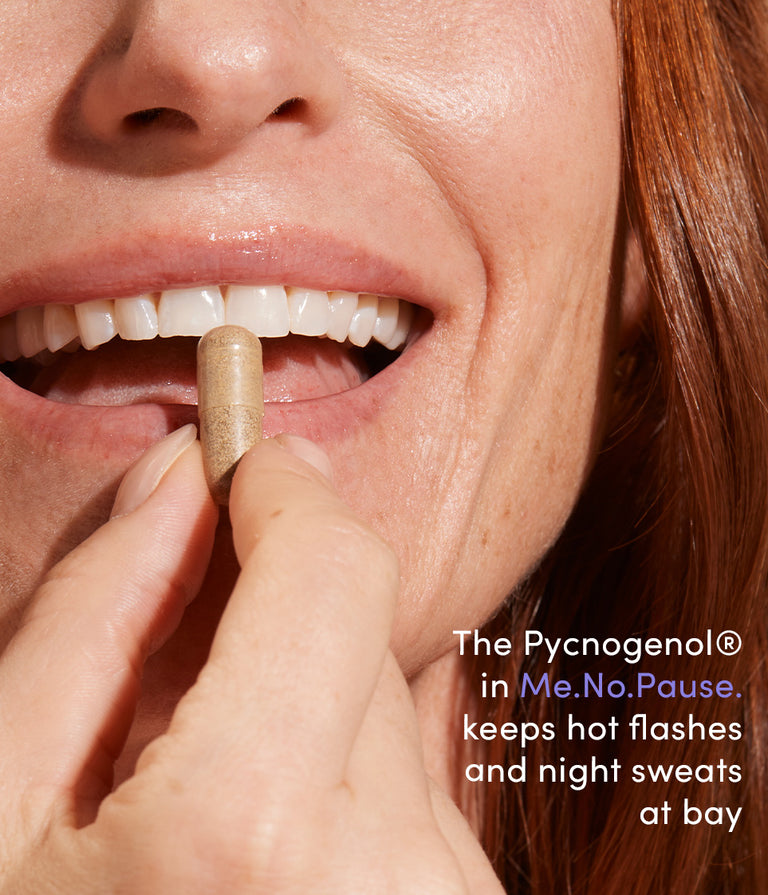By Kerstin Czarra 4-Minute Read

We hear things all of the time—from our mothers, sisters, friends, and, of course, the always-reliable Internet. But what's the real story behind the menopause myths we may believe but are afraid to ask our doctor? Here, we bring the doctor to you. Dr. Ekta Kapoor is an endocrinologist at Mayo Clinic and a specialist in menopause and women’s sexual health. Her mission is to inform and empower women of every age to learn and prepare for menopause as early as they can. “Women’s health has traditionally not been on anyone’s radar," she says. “That’s why it’s important to advocate for ourselves.” Below, we ask Dr. Kapoor to separate fact from fiction so you can enter this stage of life without the menopause misconceptions—and with accurate information to feel empowered. Want more from Dr. Kapoor? Watch our full interview with her here.
Myth: You Can Still Get Your Period
Dr. Kapoor: “You are not considered in menopause until you have not had your period for an entire year. But remember that this is a diagnosis made in hindsight. Because when a woman is having that final menstrual period, she does not know it is the last one. You really have to wait it out for 12 months, and if you have gone without having it for the full year, then you know you are in menopause.”
Myth: Menopause Causes Weight Gain
Dr. Kapoor: “Weight gain is nuanced. When you talk about pure weight gain, that is really not a menopause phenomenon but rather mostly an age-related thing. What menopause does cause is changes in body fat distribution. Meaning, women tend to carry weight in the middle section or belly area, due to the decline in estrogen. After menopause, your overall weight may not change at all, but we are all also losing muscle mass as we are getting older. So if you lose muscle mass, and gain fat, your overall weight may not change. The gained fat has a greater tendency to deposit around the belly after menopause rather than settling in the lower half of your body.”
Myth: Hot Flashes Are the Worst Symptom
Dr. Kapoor: “Yes. But that’s not the whole story. Hot flashes and night sweats are present during the menopause transition in about 75 percent of menopausal women so they are the commonest symptoms of the menopause transition. But common is not synonymous with what is truly troubling to most women. The two most bothersome symptoms I find when I talk to women in the clinic are weight gain (see above) and sexual dysfunction.”
Myth: Menopause Traits Are Hereditary
Dr. Kapoor: “There is data to support that menopausal experience can be hereditary. But it is not the same or as straightforward as a disease inherited via a single gene. The genetic influence over a woman's menopause experience is a softer one. Other things can matter more. What is your own health like? What is your body mass index? Are you a smoker or not? Do you exercise or not? These things can have a greater bearing on your menopausal experience than genetics alone. When it comes to early menopause, genetics can perhaps be a bigger player, but the genetic influence on early or premature menopause is not completely understood.”

Myth: Perimenopause Lasts One Year
Dr. Kapoor: “For most women, the perimenopause timeframe is in the ballpark of two to three years. But sometimes women are in it for longer. That can be upsetting and distressing as many women have the most bothersome symptoms during perimenopause. But for some women, symptoms such as hot flashes and night sweats may get better one they have had their final menstrual period.”
Myth: Sleep Issues Are Not Menopause-Related
Dr. Kapoor: “It can be. Sleep disturbance is a complex, multifactorial issue. Several factors can affect sleep—night sweats, mood disorders, and even just the lack of estrogen due to menopause. Broadly speaking, women with anxiety and mood issues (which may be a result of the menopause transition) usually have trouble falling asleep because the mind can’t stop. However, women with sleeping difficulties due to the menopausal state itself usually have greater trouble staying asleep—they tend to fall asleep easier, but wake up in the middle of the night and have a hard time going back to sleep.”
Myth: Brain Fog? Not a Real Thing
Dr. Kapoor: “Brain fog is multifactorial as well. Sleep deprivation and mood problems can certainly add to this difficulty, but it can be isolated as well due to estrogen deficiency. Women often find it difficult to find words, focus, or just experience a general sense of haziness. Thankfully, these cognitive difficulties do tend to clear up for a lot of women a few years after the final menstrual period.”
MORE FROM DR. KAPOOR
More Menopause 101
The Stages of Menopause
Surprising Symptoms, Real Solutions
What’s Happening Here? Hot Flashes






